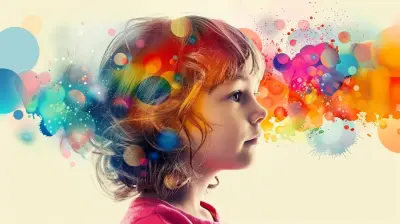The Role of Gratitude in Self-Care and Mental Health
18 August 2025
Gratitude isn’t just a fleeting feeling when someone does you a favor. It’s a game-changer in mental health and self-care. We’re talking about a simple shift in perspective that can pull you out of a dark place, boost your mood, and make life a whole lot lighter.
But here’s the thing—most people completely underestimate the power of gratitude. They think it’s just about saying "thank you." Nope. It’s a mindset, a lifestyle, and honestly, one of the most powerful mental health tools we have at our disposal.
So, let’s dive deep into how gratitude can revolutionize your self-care routine and transform your mental well-being.

What Is Gratitude, Really?
Gratitude isn’t just about recognizing the good in life—it’s about actively appreciating it. It’s about shifting your focus from what’s missing or wrong to what’s already here and working.Ever heard that saying, "What you focus on grows?" Well, that applies perfectly to gratitude. The more you practice it, the more you start noticing the good things around you. Suddenly, life doesn’t feel so heavy, and your problems don’t seem as overwhelming.
It’s about rewiring your brain to see the positives instead of dwelling on negativity. And trust me, when you do this consistently, life starts feeling a whole lot better.

The Science Behind Gratitude and Mental Health
This isn’t just feel-good fluff—science backs it up. Studies have shown that practicing gratitude regularly can:- Reduce stress and anxiety – When you focus on gratitude, your brain shifts away from stressors.
- Boost happiness levels – Gratitude triggers the release of dopamine and serotonin, your brain’s natural mood-enhancers.
- Improve sleep – A grateful mind is a peaceful mind, making it easier to fall and stay asleep.
- Enhance resilience – Life throws curveballs, but people who practice gratitude bounce back faster.
Neuroscientists have even found that gratitude rewires your brain to create lasting positive changes. It’s like upgrading your mental software to a better version—one that runs smoother and crashes less.

Gratitude as a Daily Self-Care Practice
We’re always told to practice self-care, but let’s be real—most people think self-care is just bubble baths and spa days. While those things are great, true self-care is about taking care of your mind, and gratitude is one of the most effective ways to do that.So, how can you incorporate gratitude into your daily routine?
1. Start a Gratitude Journal
This one’s simple but powerful. Every day, write down three things you’re grateful for. They don’t have to be big things—just small wins, moments, or even a good cup of coffee.2. Say It Out Loud
Every time you feel thankful for something, say it out loud. Whether it’s to a friend, your partner, or just yourself, vocalizing gratitude makes it more real and shifts your mindset.3. Gratitude Meditation
Spend a few minutes each morning focusing on things you're grateful for. Close your eyes, take deep breaths, and let it sink in.4. Write Thank-You Notes
Handwritten notes might feel old-school, but they’re incredibly impactful. Sending someone a thank-you message not only makes their day but also enhances your own sense of gratitude.5. Flip Negative Thoughts
The next time you catch yourself complaining, pause and find something to be grateful for instead. It’s a small switch, but over time, it makes a huge difference.
How Gratitude Improves Mental Health
So why does gratitude work so well for mental health? Because it shifts your focus. When you’re stuck in a cycle of stress, anxiety, or depression, your mind fixates on everything that’s wrong.Gratitude forces you to break that cycle. It’s like interrupting a negative thought pattern with a mental "pause" button. Instead of spiraling into negativity, you redirect your brain toward appreciation.
1. Less Stress, More Peace
Stress thrives on uncertainty and worry. Gratitude does the opposite—it grounds you in the present. When you appreciate what you have right now, your mind doesn’t get stuck in "what ifs" and worst-case scenarios.2. A Natural Antidepressant
Gratitude activates the brain’s reward system, releasing feel-good chemicals like dopamine and serotonin. In other words, it’s like a natural antidepressant—without the side effects.3. Stronger Relationships
Showing gratitude strengthens relationships. When you appreciate the people in your life, they feel valued and reciprocate that positivity. This creates stronger bonds and a better support system, which is crucial for mental health.4. A Resilient Mindset
Gratitude makes you tougher. When life hits hard, people who actively practice gratitude tend to recover faster. They don’t ignore challenges—they just don’t let difficulties define their entire perspective.Why Most People Struggle with Gratitude
If gratitude is so powerful, why don’t more people use it? Simple. It’s easier to focus on negativity. Our brains are wired for survival, which means they naturally cling to threats and problems more than positive experiences.But here’s the good news—you can train your brain to break that cycle. It takes effort at first, but the more you practice gratitude, the more natural it becomes. Eventually, it stops being something you “force” yourself to do and just becomes how you see the world.
The Ripple Effect of Gratitude
Gratitude doesn’t just improve your mental health—it spreads. When you’re genuinely appreciative, it affects everything:- You become more patient and kind.
- People feel more comfortable around you.
- You radiate positive energy, which attracts more good things into your life.
It’s like tossing a pebble into a pond—the ripples spread far beyond what you can immediately see.
Final Thoughts: Make Gratitude a Habit
If you take one thing from this, let it be this—gratitude isn’t a one-time thing. It’s a habit. A conscious choice. And one of the most powerful self-care practices you can adopt.So, start small. Write down what you’re grateful for, say thank you more often, and shift your focus to what’s working rather than what’s not. Over time, this simple practice will completely transform your outlook on life and create a more resilient, happier you.
Because at the end of the day, gratitude is self-care. And your mind deserves it.
all images in this post were generated using AI tools
Category:
Self CareAuthor:

Alexandra Butler
Discussion
rate this article
1 comments
Lincoln Taylor
Gratitude truly enhances mental well-being.
August 23, 2025 at 2:49 AM

Alexandra Butler
Thank you! Absolutely, gratitude serves as a powerful tool for enhancing our mental health and fostering overall well-being.


